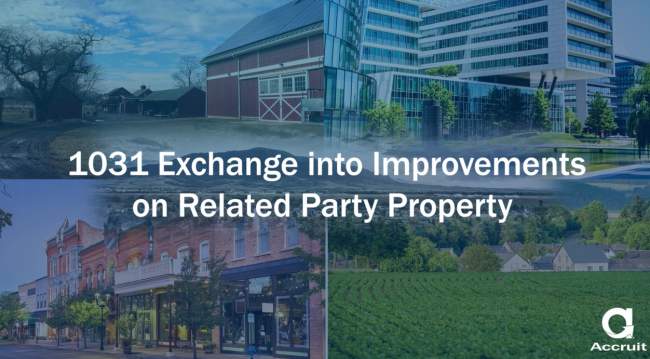BLOG
Video: 1031 Exchange into Improvements on Related Party Property

Navigating a Internal Revenue Code Section 1031 states that "no gain or loss shall be recognized on the exchange of property held for productive use in a trade or business or for investment if such property is exchanged solely for property of like kind which is to be held for productive use in a trade or business or for investment." 1031 Exchange in a low-inventory market or when lending costs are high can be challenging, especially for Exchangers looking to reinvest solely into property improvements. This video explores how a Internal Revenue Code Section 1031 states that "no gain or loss shall be recognized on the exchange of property held for productive use in a trade or business or for investment if such property is exchanged solely for property of like kind which is to be held for productive use in a trade or business or for investment." 1031 Exchange can be structured when making improvements on related party property while complying with IRC §1031 requirements.
A critical aspect of this process is ensuring that the same Taxpayer owns both the Replacement Property and the ground lease while also transferring ownership of the Relinquished Property before the exchange begins. Since a long-term leasehold interest of 30 or more years is considered like-kind to a fee-simple interest, an Also referred to as an "EAT", is typically a special purpose, limited-liability company that is used to own the legal title to property that is being parked as part of a reverse exchange. An exchange accommodation titleholder may not be a disqualified person. Exchange Accommodation Titleholder (EAT) plays a vital role in holding the leasehold interest during the buildout and improvements. Ultimately, the Exchanger acquires the ground lease and tentative improvements from the accommodator.
The key takeaway is that a long-term leasehold interest of at least 30 years qualifies as like-kind to tentative improvements. If an Exchanger owns both the Relinquished and Replacement Properties, partnering with a Internal Revenue Code Section 1031 states that "no gain or loss shall be recognized on the exchange of property held for productive use in a trade or business or for investment if such property is exchanged solely for property of like kind which is to be held for productive use in a trade or business or for investment." 1031 Exchange expert like Accruit is essential to ensure the transaction is properly structured. In this video, we break down the process and key considerations to help Exchangers navigate this type of exchange successfully.

